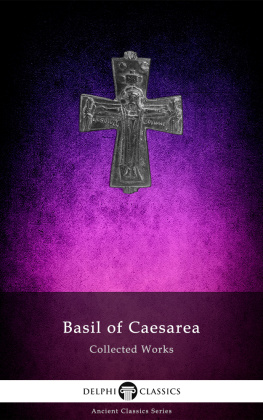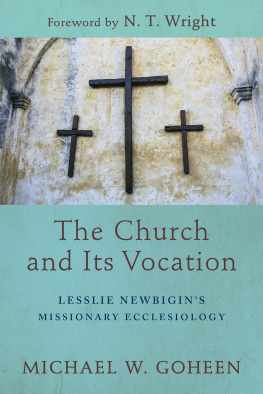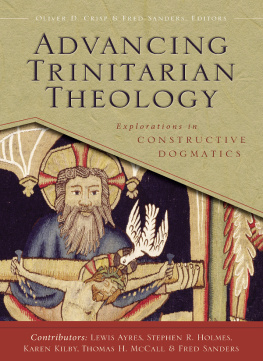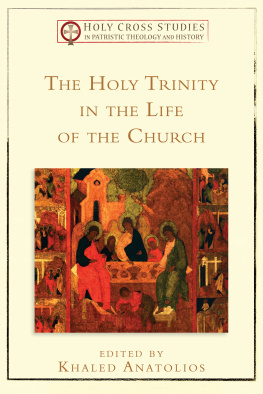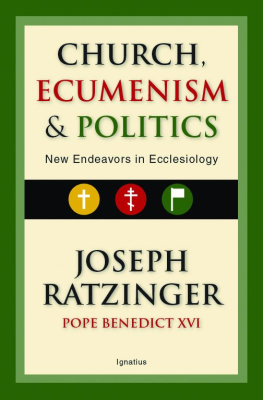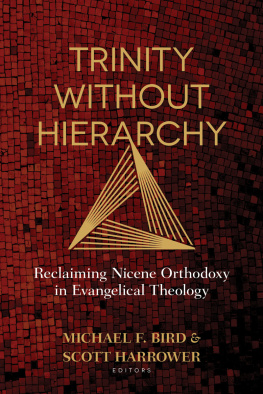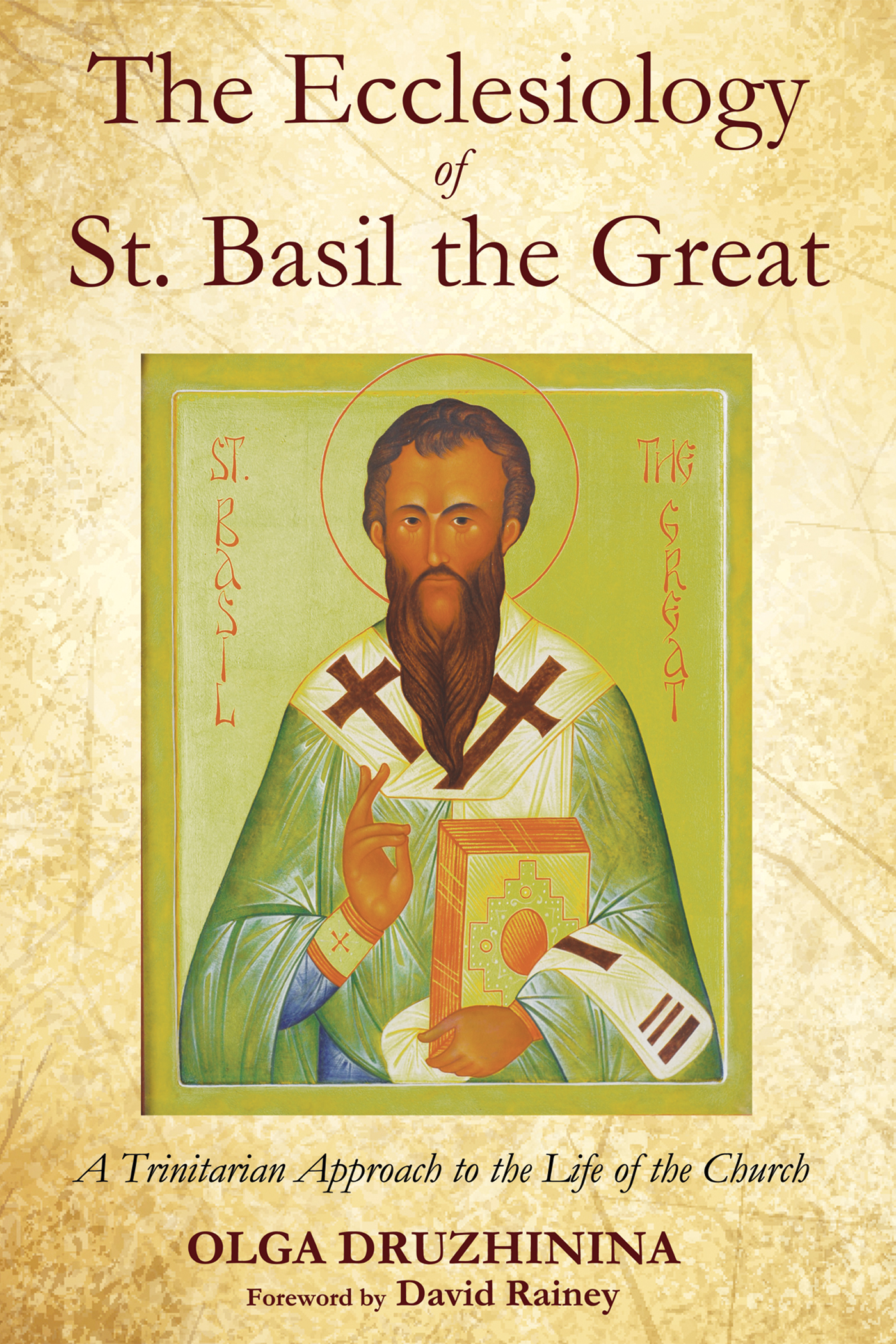The Ecclesiology of St. Basil the Great
A Trinitarian Approach to the Life of the Church
Olga A. Druzhinina
Foreword by David Rainey
Chapter
Introduction
S t. Basil the Great, bishop of Caesarea, is recognized by many Christian writers as an outstanding organizer and administrator, although he never wrote any specific document on the church. shows that a fuller and more nuanced research in this area of his thought is necessary.
The objective of this book is to produce an account of the teaching of St. Basil on the church, and to consider the relation of his ecclesiology to his understanding of the Triune God, including divine plans for humanity and Gods actions in the history of the world.
St. Basils written material consists of many letters addressed to different types of people, homilies composed to deal with many situations, and treatises that introduce us to his point of view on several important spiritual issues. Many of these works are devoted to exploring trinitarian doctrine and the role of the Holy Spirit in particular. Consequently, traces of thoughts relevant to his understanding of the church can be found among his works initially written in connection with trinitarian discussions. Collecting the ideas from St. Basils separate sayings about the church, the author of this book attempts to accomplish two things: () to show that St. Basils approach to the church is indeed trinitarian, and () to explore how he perceives the relation of this special community to the Trinity.
St. Basils theology in recent scholarship
As mentioned above, in recent scholarship rather insufficient attention has been paid to the ecclesiology of St. Basil the Great. Published in 1979 , the book The Church and the Charisma of Leadership in Basil of Caesarea by Fedwick remains the only book in English, which discusses his ecclesiology. Using mostly a pneumatological approach, the author produces an account of St. Basils understanding of leadership in the church, which is empowered and guided by the Holy Spirit. However, the relationship of the other two Persons of the Trinity to the life of the church were not treated in detail.
Two more books concerning St. Basils understanding of the church were published in German. The first book, written by Lukas Vischer, Basilius der Gro e: Untersuchungen zu einem Kirchenvater des vierten Jahrhunderts , briefly discusses different themes. It includes his views on the unity of the church (chapters ), which the author presents as constituted by the agreements of the bishops united by the confession of the same faith, the relation of the church and the state (chapter ), and an overview of St. Basils social work (chapter ). The second and more recent book, Spuren der Alten Liebe: Studien zum Kirchenbergriff des Basilius von Caesarea , which was published in 1991 by Klaus Koschorke, introduces St. Basils vision of the church as the body of Christ, which is in the process of declining from its previous state of old love and peace. Koschorkes study also covers various aspects of St. Basils ecclesiology: the life of his monastic communities, the sacraments, the relation of the church and the state, the unity of the church, St. Basils attitude toward the church of Rome, and the role of councils.
What has not yet received sufficient investigation and critique in research is the role of God the Trinity in the life of the church, which occupies a considerable place in St. Basils thought. The authors of these books provide a great deal of insight into St. Basils understanding of the present situation in the church, but they do not discuss the eschatological perspective, which reflects the involvement of all Persons of God in creation of this special community and in the maintaining of its life while leading all believers to the ultimate goal. Scholars also do not take into account St. Basils view of the church as a two-dimensional mystical reality that exists in heaven and on earth at the same time with the strong bond between these two parts.
Although there are outstanding studies that discuss St. Basils trinitarian ideas, they do not consider his ecclesiology. However, no one has yet addressed St. Basils ecclesiology in relation to his trinitarian theology.
Defining the essential aspects of St. Basils ecclesiology
Ecclesiology is the area of Christian theology, which deals with the doctrine of the church. Usually the following aspects are discussed: origins of the church, its biblical images, its relationship with God, its destiny, its role in salvation, its membership, its leadership and governance, hierarchy, its structure, authority,
Although St. Basil does not provide any systematic explanation or definition of the church, these elements of ecclesiology are present in his writings to some extent. Therefore, these texts provide a resource for acquiring a proper understanding of St. Basils doctrine of the church. Accordingly, a two-fold methodology will be used. On the one hand, we will follow an outline, which reflects the main themes of St. Basils ecclesiology; on the other hand, we will investigate his texts in order to find a relation between his ideas of the church and his ideas of the Triune God.
Owing to St. Basils way of thinking, many aspects of his ecclesiology are interrelated and they should be discussed together. This suggests that the best way to treat the material is thematically rather than to discuss different elements on separate basis. In St. Basils writings, there are at least three significant themes that unite all elements. The first theme, the relationship between the church and the Triune God, as one of the most important aspects of St. Basils ecclesiology, will create a framework for our research. The second theme, which influences all other aspects and provides the perspective, is the ultimate destiny of the church and the eschatological future of humanity. The third one is a theme of love: love of God to humanity, love of humans toward the Triune God and relationships of love among believers. All these three themes form the basis for St. Basils teaching and practice.
There are several other aspects of ecclesiology that take a prominent place in his writings and should be considered in this book. The biblical images of the church are an obvious part of St. Basils teaching. The body of Christ, the people of God, the house of God, the heavenly kingdom are mentioned a number of times in his letters, homilies and treatises. These and many other images serve as an additional source of information and reveal essential characteristics of the church.
Sacraments or mysteries of the church occupy a significant place in St. Basils conceptual framework. In his thinking, this is related to the role of the church in salvation and involves the idea that salvation cannot be found outside the church and without her mysteries. Although St. Basil does not discuss the membership of the church explicitly, he provides an answer to a question, Who constitutes the church? This aspect of ecclesiology is treated by St. Basil in connection with many other themes: a proper confession of faith, the legitimacy of the mystery of baptism, and an involvement of already departed believers in the life of the church on earth.
A discussion of the unity of the church is another leading theme in St. Basils writings, which runs through many of his letters and other works. It encompasses several aspects of ecclesiology: involvement of God in the life of the church, governance of the church, the role of bishops and leaders, hierarchy and ministry of bishops as eyes of the body, discipline and obedience of bishops to the conciliar decisions.


